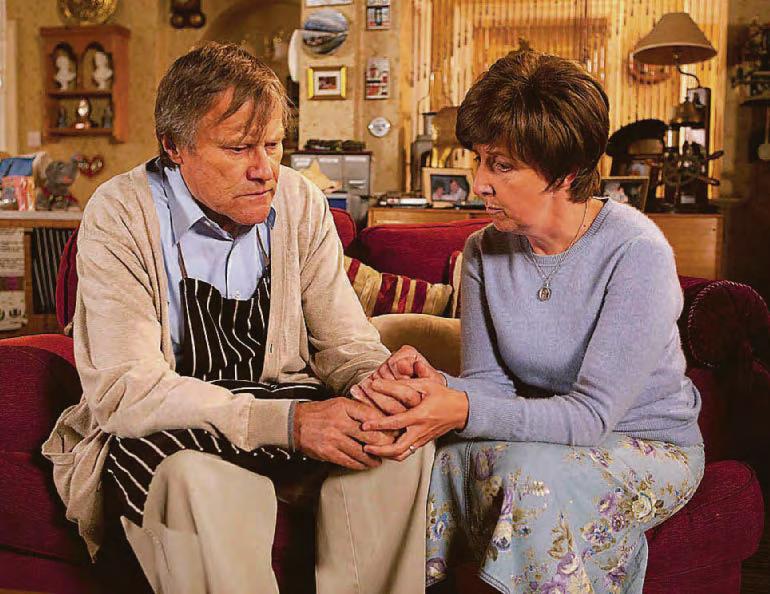Her recent role in Mr Bates vs The Post Office, playing postmaster Alan Bates' longterm partner Suzanne Sercombe opposite Toby Jones, cemented her public image ast an ordinary, decent, northern middle-aged woman.
"Mr Bates was the sort of TV drama that I would have been very jealous of if I hadn't been in it," Julie smiles today. "Its impact was incredible."
But beyond the ordinary facade, the 55-year-old's roles on television and stage are more often than not linked to challenging injustice and tackling important social issues.
In January 1998, Julie made her debut on Coronation Street as the first transgender character in a British soap opera.
Her portrayal as kind-hearted Hayley in her famous red anorak, who later married cobbles resident Roy Cropper, played by David Neilson, cut through initial opposition from some viewers.
Julie went on to be nominated as Most Popular Actress at the 1999 National Television Awards.
In fact, her 16-year stint on the show became so impactful that she and the Coronation Street writers were heralded in for Parliament changing public attitudes towards trans people. Today, she calls it "one of the proudest moments" of her life.
Julie also Sub SUH won The Best Serial Drama Performance at the 2014 National Television Awards and Best Actress at the 2014 British Soap Awards for her performance in the moving right-to-die storyline, as Hayley battled pancreatic cancer.
And away from the soap, she earned a Bafta nomination for playing rape victim Trish Winterman in series three of ITV drama Broadchurch.
Today, we're speaking as she supports the Arts Emergency. It is an award-winning mentoring charity that helps underprivileged young people find careers in the arts and one of the latest beneficiaries of the Big Give campaign, an initiative which doubles public donations to worthy causes.
It is the UK's leading match-funding charity and has overtaken Comic Relief as the UK's biggest charity campaign - raising a staggering £44.7million via its Christmas campaign last year.
Mentoring young actors without connections is a subject close to Julie's heart. Born in Accrington, Lancashire, she is not from any acting dynasty and her older brother David was the first in her family to go to university.
"I am from a very ordinary working-class background, the product of a good state school at a time when it seemed easier to make a living in the arts," says Julie.
"It was certainly a culture shock, though, moving to London to go to drama school. I remember a teacher there suggesting that, when I went back home at Christmas, I speak the whole time in RP [Received Pronunciation the 'posh' English accent regarded as carrying the highest social prestige].
"Imagine going back to Accrington and speaking like that! I'd have been lynched. I refused. I just couldn't. The way I speak, my accent, is part of who I am and where I am from."
But it is undeniably Julie's down-to-earth relatability that wins her these gritty roles and drives her to champion the arts for those not raised by comfortably off families.
Throughout her career, she has seen up close how harmful class stereotypes can be.
"I sound respectable working class so I get cast as teachers or nurses, but if you have a Scouse or Brummie accent, a lot of assumptions are made," she continues.
"Actresses with Scouse accents always get cast as sex workers! I met a lot of really posh students at drama school, people who had been to Eton, great pianists, great clarinet players. They have everything there.
"Before I went to drama school and met students from these other backgrounds, I hadn't really thought of myself as poor. I wasn't poor. We bought our underwear at M&S!
"I had seen poverty but I was just ordinary. I have to say, I was a bit chippy when I first went to London."
Arts Emergency is currently running its second annual Arts for Impact campaign in partnership with Figurative Philanthropy for Arts & Culture until Tuesday, March 25, and Julie is right behind them.
She says: "One of its slogans is 'creativity isn't a privilege'. I grew up in the Seventies and Eighties and was what I call 'state privileged'.
"I went to a good state school with supportive teachers who encouraged me in acting. When I got into drama school, it was with a full grant and so I felt supported.
"When I graduated, I was on the dole and learnt on the job in fringe theatre in London.
We literally wrote handwritten letters to famous actors and people like Emma Thompson and John Gielgud gave us money for the theatre."
SHE continues: "Over recent decades, funding to the arts has been eroded while music and drama are seen as soft subjects in schools - with money for them cut.
"If you look at schools like Eton with their amazing art blo...


